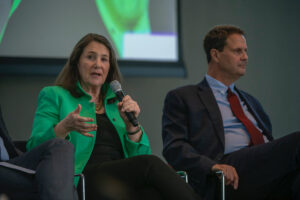For media inquiries, please contact Cynthia Eveleth-Havens at [email protected].
DENVER – The Colorado Chamber of Commerce today held its seventh biennial congressional luncheon, bringing together all eight members of the House delegation to discuss federal business policy issues held at the Denver Art Museum. U.S. Reps. Diana DeGette, Joe Neguse, Jeff Hurd, Lauren Boebert, Jeff Crank, Jason Crow, Brittany Pettersen, and Gabe Evans participated in the panel, which was moderated by Shaun Boyd, political reporter for CBS News Colorado.
The delegation discussed a range of issues, including House Resolution 1, the “Big Beautiful Bill” signed by the president last month. Other topics included Chamber priority issues, from housing and child care to regulations and energy.
“I’m honored to join my colleagues for this important discussion hosted by the Colorado Chamber of Commerce,” said Rep. Evans. “Our business community is the backbone of our state’s economy, driving innovation, creating jobs, and strengthening our communities. By working together in a bipartisan fashion, we can find real solutions that keep Colorado at the forefront of entrepreneurship and ensure our businesses have the tools they need to thrive.”
One critical issue for the Chamber over the last several years has been addressing the affordability and availability of housing. When asked what is being done at the federal level, Rep. Neguse pointed to the ROAD to Housing Act, a bipartisan bill to address the national housing shortage.
“When I travel in my district, it is by far the most common issue that I hear from constituents,” Rep. Neguse said. “There does seem to be a political consensus emerging at the federal level that this is something that warrants the attention of policymakers. There’s a lot that can be done at the federal level and time will tell if that bipartisan consensus is sufficient enough to actually get a bill to the president’s desk.”
Rep. Crow attributed housing pressures to a larger workforce issue across the state, especially for boosting the aerospace industry.
“We have now reached a tipping point where we no longer have the competitive advantage against the other states that we’re competing with to recruit that workforce. The cost of living has skyrocketed, congestion has skyrocketed, and our education system is chronically underfunded” Rep. Crow said. “For housing, we have to streamline that and reduce some of those burdens and hurdles to make it easier, quicker and cheaper to build in America and in Colorado. If we are able to do those things, I think we can reclaim our competitive advantage again.”
Reducing regulatory burdens has been the Colorado Chamber’s top focus in 2025. When asked how the federal government should approach providing regulatory relief for businesses, Rep. Hurd focused on permitting reform and pointed to two specific examples.
“First, set the timing and deadlines for things like environmental assessments and impact studies to the date of first contact with the agency – don’t stretch it out for years,” Rep. Hurd said. “The other one is to put in a lead agency in charge and have them responsible for making sure all the other coordinating agencies get things done by the deadline. There is an opportunity for us to work together at the federal and state level to see how we can more effectively implement public policy and improve the process.”
Rep. Boebert agreed that reducing regulations across all levels of government will boost the business community and economy, especially for the energy industry.
“I think we all agree that we want good, reliable energy. We want clean air and clean water,” Rep. Boebert said. “But Colorado has been regulated into poverty in many areas, and a lot of that was because of state regulation, some of it still is. For us to get our energy policies right, the priority is to deregulate and to create American jobs – not only to maintain our energy security and independence, but also to pursue energy dominance.”
Another timely issue discussed on the panel was the regulation of artificial intelligence (AI), which is a topic of the upcoming special session in Colorado. Rep. Pettersen was a member of a U.S. House task force on AI and believes that a regulatory framework needs to be set at the federal level.
“A patchwork approach is impossible for companies to navigate, we’ve seen this already with states taking up regulation because the federal government isn’t acting,” said Rep. Pettersen. “I think it’s really challenging to actually get state government to do this work, so it’s very important we do this at the federal level. It’s going to define the next century on who’s leading the globe, whether people are looking to China, or whether it’s the United States setting the standard. We need to prosper here in the United States, we need our businesses thrive, and we need to be setting that standard.”
When asked about tariffs, Rep. DeGette cautioned the long-term impacts on the business community. She noted that while inflation and prices haven’t increased significantly yet, companies have been absorbing costs and it could ultimately have unintended consequences for businesses and the public.
“It’s caused great consternation and instability,” Rep. DeGette said. “My concern is that if this goes on long enough, it is going to impact American taxpayers and American families, who are going to have to pay more for consumer goods. This is going on all around the world, and I think we should be very, very concerned about the mercurial aspect of these policies.”
“I am grateful to the Colorado Chamber of Commerce for hosting Colorado’s U.S. House of Representatives delegation,” Rep. Crank. “Having the opportunity to have bipartisan, civil, and transparent discussions on the topics most important to Coloradans is imperative, ensuring that we are working for the people of our state.”
###
The Colorado Chamber of Commerce champions free enterprise, a healthy business environment and economic prosperity for all Coloradans. It is the only business association that works to improve the business climate for all sizes of business from a statewide, multi-industry perspective. What the Colorado Chamber accomplishes is good for all businesses, and that’s good for the state’s economy. It was created in 1965 based on the merger with the Colorado Manufacturers’ Association.




